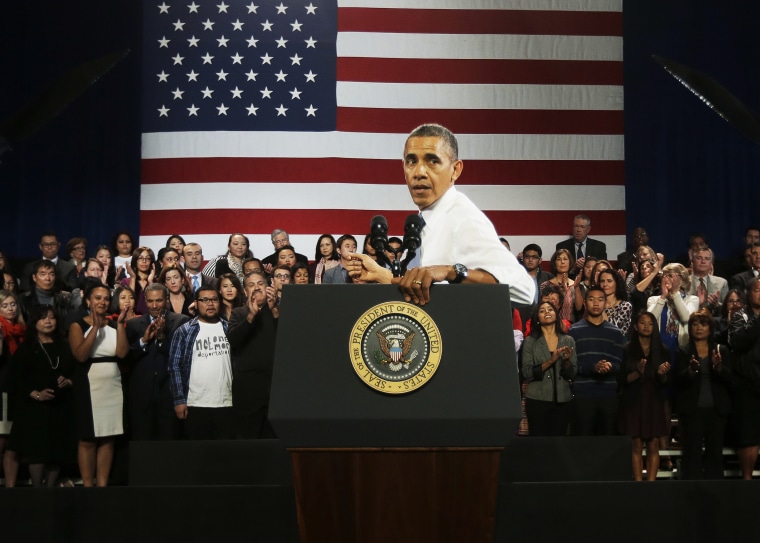President Obama’s supporters aren’t thrilled that House Republicans keep blocking any and every legislative item on his agenda. But at a fundraiser in California on Monday, Obama warned them they shouldn’t expect him to do an end run around them to force change on major issues instead.
“Somebody keeps on yelling, ‘Executive order,’” Obama said. “Well, I’m going to actually pause on this issue because a lot of people have been saying this lately on every problem, which is just sign an executive order, and we can pretty much do anything and basically nullify Congress.”
It was the second time in less than 24 hours the president had addressed the issue. Earlier Monday, an immigration activist interrupted a speech by Obama in San Francisco, calling out “You have a power to stop deportation for all undocumented immigrants in this country!”
“Actually, I don’t,” Obama replied.
At his fundraiser later that night, Obama pressed the argument, telling donors that his administration could only do so much on its own and that "there is no shortcut to democracy." Sure, Congress may be a barren unforgiving wasteland where legislation goes to die a long and painful death, but it's the only game in town.
“As laborious as it seems sometimes, as much misinformation as there is out there sometimes, as frustrating as it may be sometimes, what we have to do is just keep on going, keep on pushing, he said. “And eventually, we move in a better direction.”
Obama offered a specific example, the military’s Don’t Ask Don’t Tell policy, which his supporters called on him to end through executive order alone. Instead, he spent two years building support for the change before passing it through Congress with bipartisan backing. Lately, LGBT rights activists have urged Obama to ban discrimination against gay and transgender federal employees, an issue the White House has preferred to address through Congress.
There have been a number of key points where the White House and progressives have disagreed over the limits of Obama’s powers. One notable case is the debt limit, where many observers have argued the Constitution empowers the Treasury Department to either ignore Congress or get around its requirements by minting trillion dollar coins to fill its coffers. The White House ruled out both paths as legally unsound.
Regardless of Obama’s claims that his hands are tied, there’s a good reason activists push so hard for administrative solutions to their problems: they sometimes win.
When he first took office, the president used to tell immigration activists it was beyond his power to halt deportations for young undocumented immigrants. But as protests mounted, he changed his mind and did just that in 2012. Obama also told gay rights activists that his administration was required to protect the Defense of Marriage Act in court, despite his personal desire to repeal the law. He ended up reversing his position on that too and eventually a Supreme Court decision overturned parts of the law.
Ironically, while Obama is beset by progressive demands that he take a more aggressive tack through administrative action, it’s a given on the right that the president has engaged in unprecedented abuse of power through executive orders. The most prominent recent example is the administration’s tweaks to various Affordable Care Act deadlines, which Republicans argue only Congress can approve.
But Obama has issued fewer executive orders than most modern presidents and mainstream legal experts don’t see much that’s particularly unusual about their scope.
“It’s always hard to quantify, but he seems to me well within the mainstream of recent presidents in his use of executive orders and other instruments for directing policy,” Eric Posner, a professor of law at University of Chicago, told msnbc.
No one's making the case that Obama's various administrative fixes, especially on immigration, are a better solution than changing the law. For one thing, they're vulnerable to being reversed by whoever takes office next. For another, they can poison relations with Congress and make legislation harder to enact, though these days those complaints seem almost quaint.
But they do move the ball forward in the short term. And given that the Republican Congress is unlikely to approve policy changes of any significance over the next three years, you can expect liberal calls for action to swell over time.
